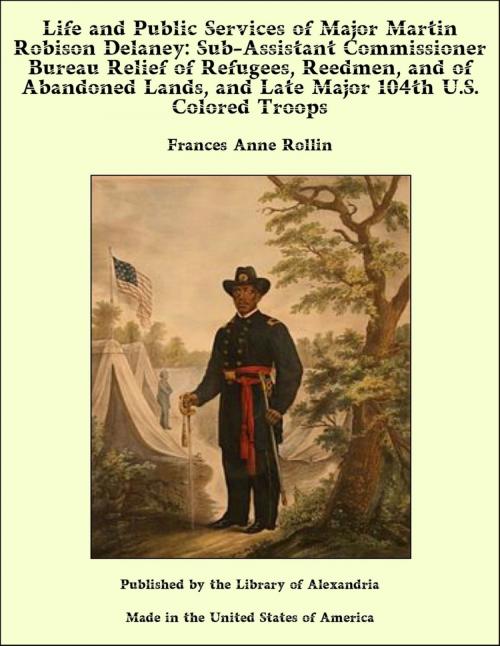Life and Public Services of Major Martin Robison Delaney: Sub-Assistant Commissioner Bureau Relief of Refugees, Reedmen, and of Abandoned Lands, and Late Major 104th U.S. Colored Troops
Nonfiction, Religion & Spirituality, New Age, History, Fiction & Literature| Author: | Frances Anne Rollin | ISBN: | 9781465612243 |
| Publisher: | Library of Alexandria | Publication: | March 8, 2015 |
| Imprint: | Language: | English |
| Author: | Frances Anne Rollin |
| ISBN: | 9781465612243 |
| Publisher: | Library of Alexandria |
| Publication: | March 8, 2015 |
| Imprint: | |
| Language: | English |
In reviewing the history of the late civil war, it will be found, as in former revolutions, that those who were able to master its magnitude were men who, prior to the occasion, were almost wholly unknown, or claimed but a local reputation. Measures which before were deemed impracticable and inexpedient, in the progress of the war, were considered best adapted to meet the exigencies of the time. A race before persecuted, slandered, and brutalized, ostracized, socially and politically, have scattered the false theories of their enemies, and proved in every way their claim and identity to American citizenship in its every particular. While the war between sections has erased slavery from the statutes of the country, it has in no wise obliterated the inconsistent prejudice against color. Among the white Americans, since the rebellion, from the highest officer to the lowest subaltern, there is a recognized precedence for them, in view of their patriotism and valor in the hour of peril and treachery. They recognized their duty when Southerners had ignored it: for this we honor them; and none would gainsay an atom of the praise bestowed: the country had always honored and protected them at home and abroad, and in enhancing her prestige, they have added to their own as American citizens. But in the same dark hour of strife and treachery, there went forth from the despised and dusky sons of the republic a host, who, though faring differently, contributed no meagre offering to the cause of the Union. In the foremost rank of battle they stood, stimulated alone by their sublime faith in the future of their country, instead of being deterred by the disheartening experiences of the past. From their first hour in the rebellion to the last, theirs was a fierce, unequal contest; they were found enlisting, fighting, and even dying under circumstances from which the bravest Saxon would have been justified in shrinking. For them there was “death in the front and destruction in the rear”—torture and death as prisoners in the rebel lines, and the perils of the mob in many of the loyal cities awaiting them when seen in the United States uniform. Despite all opposition, they have traced their history in characters as indestructible as they are brilliant, to the confusion of their enemies. On every field, negro heroism and valor have been proved by them in a manner which has established for their race a grandeur of character in American annals, that, when read by the unprejudiced eyes of futurity, will gleam with increased splendor amid their unfavorable surroundings; while in song and story their deeds of prowess will live forever, reflecting the glories of Port Hudson, the crimson field of Olustee, and the holy memories which cluster about Fort Wagner.
In reviewing the history of the late civil war, it will be found, as in former revolutions, that those who were able to master its magnitude were men who, prior to the occasion, were almost wholly unknown, or claimed but a local reputation. Measures which before were deemed impracticable and inexpedient, in the progress of the war, were considered best adapted to meet the exigencies of the time. A race before persecuted, slandered, and brutalized, ostracized, socially and politically, have scattered the false theories of their enemies, and proved in every way their claim and identity to American citizenship in its every particular. While the war between sections has erased slavery from the statutes of the country, it has in no wise obliterated the inconsistent prejudice against color. Among the white Americans, since the rebellion, from the highest officer to the lowest subaltern, there is a recognized precedence for them, in view of their patriotism and valor in the hour of peril and treachery. They recognized their duty when Southerners had ignored it: for this we honor them; and none would gainsay an atom of the praise bestowed: the country had always honored and protected them at home and abroad, and in enhancing her prestige, they have added to their own as American citizens. But in the same dark hour of strife and treachery, there went forth from the despised and dusky sons of the republic a host, who, though faring differently, contributed no meagre offering to the cause of the Union. In the foremost rank of battle they stood, stimulated alone by their sublime faith in the future of their country, instead of being deterred by the disheartening experiences of the past. From their first hour in the rebellion to the last, theirs was a fierce, unequal contest; they were found enlisting, fighting, and even dying under circumstances from which the bravest Saxon would have been justified in shrinking. For them there was “death in the front and destruction in the rear”—torture and death as prisoners in the rebel lines, and the perils of the mob in many of the loyal cities awaiting them when seen in the United States uniform. Despite all opposition, they have traced their history in characters as indestructible as they are brilliant, to the confusion of their enemies. On every field, negro heroism and valor have been proved by them in a manner which has established for their race a grandeur of character in American annals, that, when read by the unprejudiced eyes of futurity, will gleam with increased splendor amid their unfavorable surroundings; while in song and story their deeds of prowess will live forever, reflecting the glories of Port Hudson, the crimson field of Olustee, and the holy memories which cluster about Fort Wagner.















